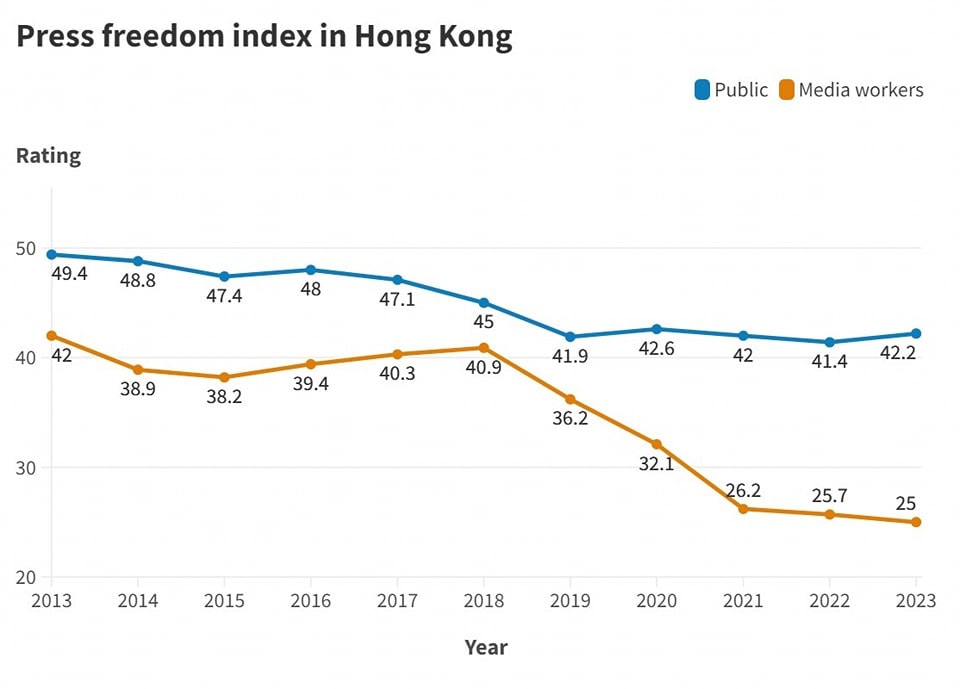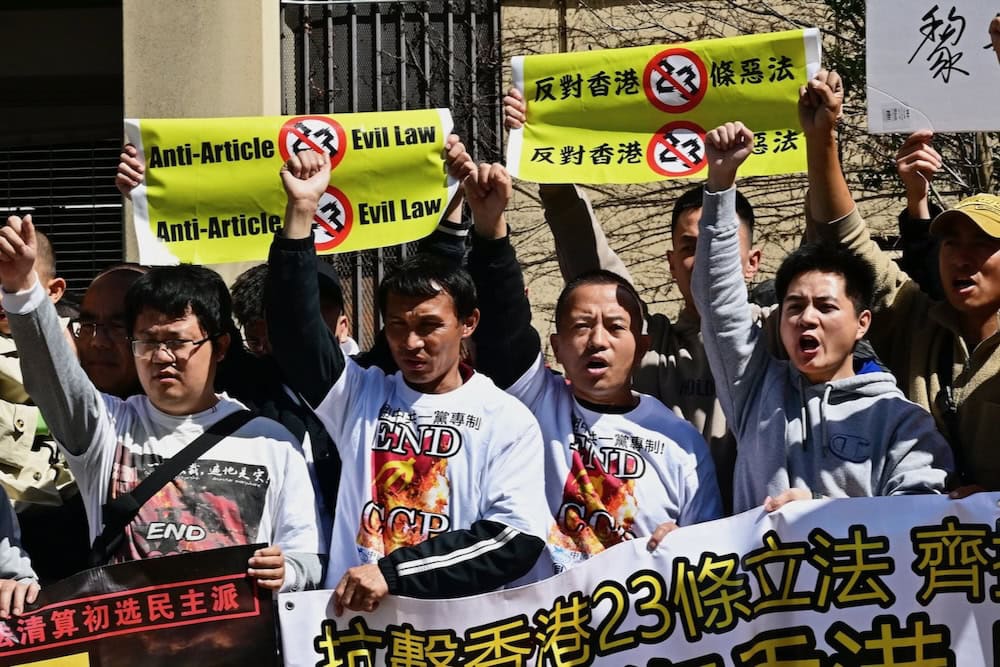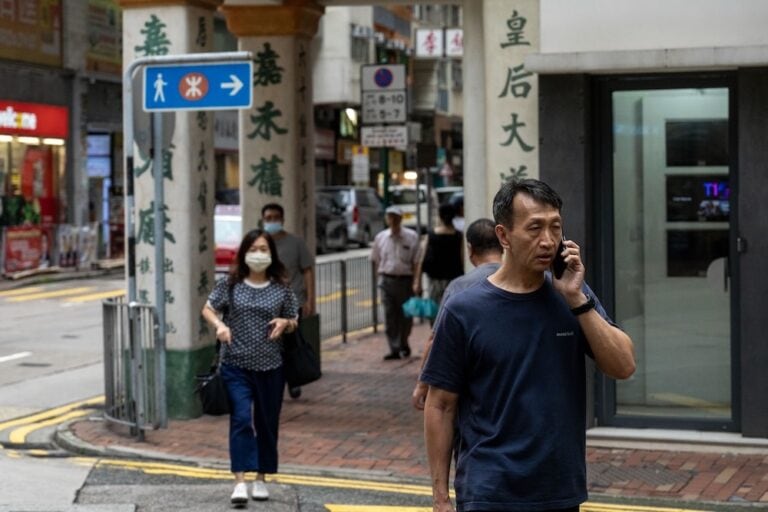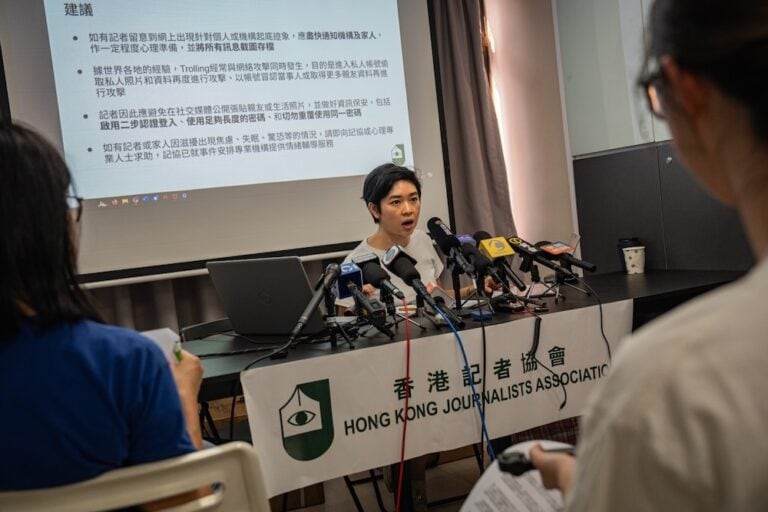Journalist respondents were highly concerned about the potential impact of Article 23 national security legislation.
This statement was originally published on HKJA’s Facebook page on 19 August 2024.
Press freedom in Hong Kong at 11-year low according to media survey, amid fears over Article 23 national security law
Press freedom in Hong Kong has continued its downward slide, an annual survey by the Hong Kong Journalists Association shows, with many reporters fearing further restrictions as a result of recently-introduced Article 23 national security legislation.
In the latest Press Freedom Index, published by the HKJA on 20 August, journalists gave the city a score of 25 for press freedom, a decline of 0.7 points from the year before and a record low for the index since it was established in 2013. The public score continued to hover around 42, which it has done since 2019, with a 0.8 increase to 42.2 in the latest survey.
Link to graph: https://public.flourish.studio/visualisation/18964961/
Despite this, more than half — 53% — of the public said press freedom had declined in the past year, while only 13% said matters had improved, compared to 46 and 19 per cent respectively in the previous survey. For the fifth year in a row, more than 90% of journalist respondents said press freedom had declined.
Link to graph: https://public.flourish.studio/visualisation/18966088/

HKJA
Carried out in partnership with the Hong Kong Public Opinion Research Institute (PORI), the index is based on around 1,000 phone interviews with randomly-selected members of the public and surveys of 251 working journalists, between March and May 2024, asking their opinions about the state of press freedom and the effect of specific incidents within the past year.
Journalist respondents were highly concerned about the potential impact of Article 23 national security legislation — introduced in March 2024 — on the media in Hong Kong, with more than 90% saying this would significantly impact press freedom in the city.
Prior to the legislation’s passage, the HKJA and other press groups, including the Foreign Correspondents’ Club of Hong Kong, expressed concern about language within the law around sedition and state secrets.
Members of the public were less worried about Article 23, with 39 percent saying it would impact press freedom. Compared to the Press Freedom Index in 2020, 52 percent of the public believe National Security Law legislation would impact press freedom.
This discrepancy may be explained by the relatively less heated discussion around Article 23 compared to the 2020 National Security Law, and perceptions that the press was already restricted by that earlier legislation, whereas journalists are more cognizant of potentially running afoul of the new crimes created by Article 23 when reporting, such as offenses related to state secrets.
Link to graph: https://public.flourish.studio/visualisation/19010625/
With regard to other major incidents in the past year, journalists also cited as highly damaging to press freedom the ongoing national security prosecution of former Apple Daily publisher Jimmy Lai, the government’s decision to bar entry into Hong Kong of several foreign journalists and media observers, the disappearance of a South China Morning Post reporter in China, and Ming Pao’s decision to stop publishing political cartoonist Zunzi.
In tabulating the press freedom index, PORI draws on a number of factors. The main issues driving down the score given by journalists were increased reticence of the media to criticize the Hong Kong government (-0.4 points), the failure of the law to uphold access to information (-0.3 points), and a drop in watchdog function of the media (-0.2 points).
The increase in the overall public score was driven by a perception of fewer physical threats towards journalists (+0.3 points), that the media had less scruples about criticizing the central government (+0.2 points), criticizing large corporations (+0.2 points) , and, contrary to journalists’ own experience, a perception that access to information had improved (+0.2 points). The public also perceived a drop in the diversity of news, with a 0.2 point decrease on the previous year.
Since the Press Freedom Index was founded in 2013, there has been a clear downward trend in the ratings of both the public and journalists. The latter has dropped sharply from 42 to 25 in the past decade, while the public score fell from 49.4 to 42.2. In neither case has the index ever gone above 50.
For detailed data mentioned in the press release, please visit: http://tiny.cc/HKPFI2023_data (Chinese only)
For the detailed report, please visit: http://tiny.cc/HKPFI2023_report (Chinese only)



